We run our website the way we wished the whole internet worked: we provide high quality original content with no ads. We are funded solely by your direct support. Please consider supporting this project.
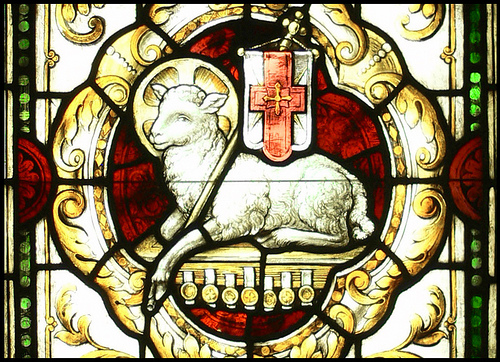
God’s Kind of Holy War
This is part three of a series on Revelation. You can find part one here and part two here.
While there will come a day when the sacrificial victory of the Lamb and of his people will be apparent to all (5:13; 15:4; 21: 23-4), only to those who embrace the perspective of the heavenly throne can see this reality. To all others, it looks like the beast has won, which is why they worship it (11.7; Rev. 13:4. 7). This sets up the battle between truth and deception that the Lamb’s army is called to wage and that runs throughout Revelation. God’s plan is to use faithful followers of the Lamb to free “all the nations” from the oppressive deception of the beast and to invite them to come into his kingdom.
What is being contested in this holy war between “deceit and truth” is the kind of power that is worthy of God and that will prove victorious in the end. The beast deceives people into believing that military and political power is the way forward. The Lamb and his followers proclaim and embrace the truth that suffering prevails in the end. John is communicating that the holy war that the Lamb and his followers are called to fight is no less real than earthly wars; and followers of the Lamb are called to fight no less valiantly than earthly warriors. It is just that the followers of the Lamb are called to fight the way the Lamb fought: not by killing, but by choosing to be killed rather than to resort to violence.
Just as John transformed the traditional image of the Messiah as a mighty Lion by identifying it as a slain Lamb in chapter 5, John transforms the traditional image of holy war by identifying it as a Lamb-war. Holy war language permeates this book (e.g. 11:7; 12:7-8, 17; 13:7; 16:14; 17:14; 19:11, 19), to the point that it could be described as a “war scroll,” similar to that found at Qumran. Yet, John turns this holy war imagery on its head by consistently associating it with the Lamb. While Qumran envisioned an eschatological war in which God’s people would rise up violently against evil doers, Revelation envisions an eschatological war that has already begun and in which God’s people rise up and voluntarily suffer at the hands of, and for the sake of, evil doers, just as Christ did. Hence, though it certainly is a war scroll, it is one of non-violent, self-sacrificial, warfare.
The pervasiveness of the holy war motif in Revelation is reflected in the consistent depiction of the Lamb and his people as conquerors (2:7, 11, 17, 28; 3:5, 12; 3:21; 5:5; 12:11; 15:2; 17:14; 21:7). The foes they conquer are not fellow humans, however, but Satan, his demonic kingdom, and all forms of deception that they imprison the citizens of Babylon with. And they conquer these foes simply by faithfully imitating the Lamb and, therefore, by bearing witness to the truth of God’s Lamb-like character, reign, and means of overcoming evil. The call to martyrdom in Revelation is thus not a call to passively accept death. It is, rather, a call to actively resist the influence of Babylon and the beast to the point of death.
John’s transformation of the holy war motif is especially evident in Revelation 7. John hears that 144,000 people from the 12 tribes of Israel have been sealed (7:4-8), but when he looks, he sees “a great multitude that no one could count, from every nation, tribe, people and language, standing before the throne and in front of the Lamb” (7:9).” By juxtaposing what he sees with what he hears, John transforms a traditional conception of an exclusively Jewish eschatological army into an innumerable army that is transnational in character (cf. 5.9; 7.9; 11.9; 13.7; 14.6). Moreover, while the 144,000 are listed in the form of a military census, and while they follow the Lion of Judah, the soldiers in this vast trans-national army are victorious because they “have washed their robes and made them white in the blood of the Lamb”(7:14). In this way, they are martyrs, not traditional warriors, who conquer by participating in the sacrifice of the Lamb.
In fact, the washing itself is a military metaphor, referring to the purification washing soldiers traditionally went through after battle. But while traditional warriors washed away the blood of their defeated foes, the warriors in the Lamb’s army are washed in the shed blood of the One they follow. This imagery is no longer about sacrificing enemies; it is about being willing to be sacrificed by enemies and on behalf of enemies.
Photo credit: Waiting For The Word via Visualhunt.com / CC BY
Category: General
Tags: Book of Revelation, Jesus, Lamb of God, Self-Sacrificial Love, Spiritual Warfare
Topics: Biblical Interpretation, Spiritual Warfare, Cosmic Conflict
Related Reading

Creating God in Our Own Image
How have we created God in our own image? In this short video produced by The Work of the People, Greg reflects on various ways that humans typically think about God in terms of power, and how Jesus reframes the nature of power. The Christian revelation of God is the opposite of what we most often imagine…
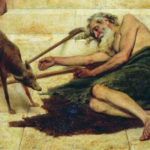
What About Violence in the Parables? (podcast)
Greg examines the harsher parables. Episode 524 http://traffic.libsyn.com/askgregboyd/Episode_0524.mp3
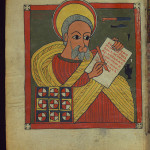
Are the Gospels Historical Fiction?
Some scholars today argue that the stories recorded in the Gospels are actually intentional fabrication. In essence, they argue that Mark took Paul’s theology and robed the story of Jesus in a fictitious historical narrative. The other Gospels followed suit. The argument is clever and removes the difficulty of explaining how a legend of a…

Following Jesus from the Margins
D. Sharon Pruitt via Compfight Kurt Willems posted a reflection today entitled From the Margins: Following Jesus in a post-Christian culture. I hope everyone will read this. It’s a perspective from the anabaptist tradition that finds inspiration from the same data that evangelicalism finds alarming. May we all follow Jesus from the margins and offer…
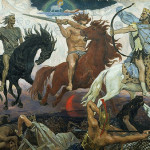
Unpacking Revelation: Is it Literal?
According to many scholars as well as many Christian laypeople, the Jesus we find in the book of Revelation engages in a great deal of violence. This violence reaches a zenith in chapter 19 where we find Jesus going out to make war on a white horse (v. 11). He is dressed in a blood…
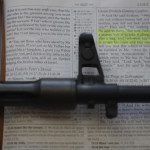
Did Jesus Instruct Us to Arm Ourselves?
Over the past few posts, I’ve been dealing with the passages that are frequently used to argue how Jesus condoned violence. One of these takes place just after the last supper and just before Jesus and his disciples were going to travel to the Mount of Olives to pray. To prepare his disciples, Jesus tells them;…
